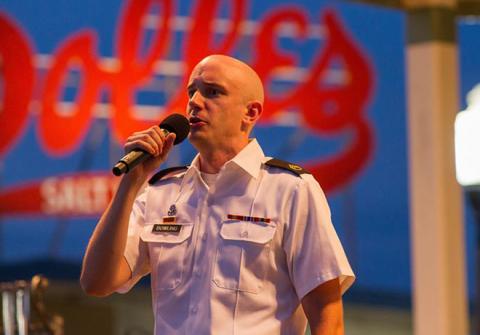Ian Bowling Reflects on Touring with the Soldiers’ Chorus of the United States Army Field Band

Alumnus Ian Bowling (M.M. '14, vocal pedagogy and voice performance), who has been a singer with the Soldiers’ Chorus of the United States Army Field Band since graduating from The Boston Conservatory, reflects on being an active-duty member of the U.S. Army while performing a wide range of repertoire for audiences across the country.
During the final year of my M.M. degrees in voice performance and vocal pedagogy, I auditioned for the Soldiers’ Chorus of the United States Army Field Band. Since May 20, 2014, I have been a full-time military musician for the U.S. Army.
If you’re not sure what a military musician is, or have never heard of one, you’re not alone. For whatever reason, many educational institutions don’t seem to have connections to military bands, or don’t have the information at hand to explain this career path to their students.
The mission of the U.S. Army Field Band is “To serve and inspire the American people by telling the Army story and honoring our soldiers and veterans at home and abroad as the musical ambassadors of the Army.” We achieve this purpose through touring. The Concert Band and the Soldiers’ Chorus tour together, taking three buses, two trucks, and a small fleet of vans out on tour for about 100 days every year.
Since I joined, I’ve performed in 34 states I’d never even visited before. We perform free concerts almost every night, in venues ranging from beautiful stages and concert halls to high school gymnasiums and public parks. We also set aside a few days for community outreach, during which we break up into smaller ensembles and perform in schools or veterans’ homes. Sometimes, we even conduct clinics and master classes for high school and collegiate music students.
What does this all mean for me? Well, there was definitely a shift in lifestyle. This position is active-duty service, meaning everyone in our unit is a full member of the U.S. Army. The day after I graduated from the Conservatory, I left for basic combat training in Fort Leonard Wood, Missouri. Every year, I am required to pass weigh-ins, complete physical fitness tests, attend training seminars, and various other Army-wide requirements. But this is not to say that my musical experiences have been dampened in any way—quite the opposite!
At any given concert, we have the opportunity to sing many different styles of music. As you might expect, we sing the patriotic favorites, such as the national anthem and “God Bless America.” But we also sing opera, musical theater, jazz, pop, a cappella, and almost anything you can imagine.
Currently, the most exciting aspect of my work is an operatic event called The Falling and the Rising. One of our tenors, Ben Hilgert, convinced the Army to work with a few opera companies to commission a one-act opera about U.S. Army veterans. Composer Zach Redler and librettist Jerre Dye created a masterpiece; we workshopped it at Seagle Music Colony last fall, and we just premiered it in April at Texas Christian University in Fort Worth, Texas. The thing I miss most about my time at Boston Conservatory is working through the whole process of a fully staged production; my touring schedule makes those opportunities now. But this experience has brought that back in my life.
If you had told me when I was younger that I’d one day join the military, I never would have believed it. But this career path has been more rewarding, both as a singer and a citizen, than I ever could have wished for.
